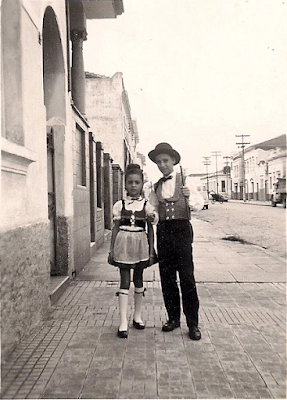Brazilians have sung in English since I don't know when. Nilo Sergio recorded quite a few 78 rpms in the 1950s. Tony & Celly Campello's very first single for EMI-Odeon was 'Forgive me' b/w 'Handsome boy'. There was an independent label called Young (1959-1960) which recorded Brazilian acts performing exclusively in the English language.
But nothing compares with a new trend - I actually call it 'Hybrid-English-acts' - which started in late 1971, when Terry Winter recorded 'You'll notice me'. Terry who started singing rock in Portuguese in the mid-1960s was a Brazilian act named Tommy Standen whose parents were British expats. After trying really hard (in vain) to break into the recording scene Standen finally switched to writing his songs in English to compete with American and British bands that commanded the charts.
Now, let's go back five years in time to late 1966, and see who actually started this new trend that took half-a-decade to lift off.
(6290) This is not the Great Rock'n'roll Swindle but a Brazilian-style Rip-off Scheme that RCA artistic director Ramalho Netto engendered. It all started at the week-end of 27 August 1966, when Bobby Hebb's 'Sunny' reached #2 at Billboard's and 'See you in September' by The Happenings got to #3.
Eager to make a buck, Ramalho summoned Toninho Paladino, a record-shop owner at Rua Augusta in São Paulo who knew a garage band that covered US & British hits and made them an offer: to cover those songs for the Brazilian market. They were: Helio Eduardo Castilho de Toledo da Costa Manso (vocal), Paulo Afonso Lello Sampaio (bass), João Rodrigues da Cunha Neto (drums), Antonio Carlos da Gama e Silva (guitar), Luiz Marcelo Gaggiano and Sonia Maria Abreu (vocal).
'See you in September' had been first recorded by The Tempos in 1959, having reached #23. Eight years later, The Happenings, a vocal group from Paterson, N.J. covered it for B.T.Puppy Records and it hit the big time. As soon as 'See you in September' was released in Brazil (by Mocambo-Rosenblit) in October 1966, and started playing on the radio, RCA, released its cover-of-the-cover and to fool the record-buying public RCA called the up-to-now nameless band as The Happiness!
When Mocambo's owner found out about the swindle, he rang up Mr Ramalho and probably threatened him with a law-suit, so RCA stopped printing the band's name as The Happiness and came up with The Mustangs, a name they carried on until they switched to Sunday, in early 1970, and recorded an E.P. for independent label Som/Maior featuring a cover of Lou Christie's 'I'm gonna get married' which went to #1 in the charts for many weeks.
This whole story (and much more) is well told by Ayrton Mugnaini at:
(6362) The Mustangs with their 2nd release: they cover Cliff Richard & The Shadows' 'In the country' b/w 'When summer is gone', done originally by Gary Lewis & his Play Boys.
(6424) The Mustangs cover two Procol Harum songs: 'Homburg' b/w 'Conquistador' (Gary Brooker-Keith Reid) that were not released in Brazil due to a contractual dispute between Deram & EMI-Odeon.
(6520) The Mustangs's cover of 'Proud Mary' was their last single before they changed their name to Sunday, and were signed by Som Maior, where they covered Lou Christie's 'I'm gonna get married' on an E.P. which went to #1 nationally.
In 1970, The Mustangs would change their name to Sunday and have a #1 hit with a cover of Lou Christie's 'I'm gonna get married' ('Tema de amor' de Titina) that was featured in 'Super Plá', a popular tele-novela on TV Tupi which ran from December 1969 to May 1970. Later on, Helio Eduardo Costa Manso, would change his name to Steve MacLean and record as if he were a foreign act.



































